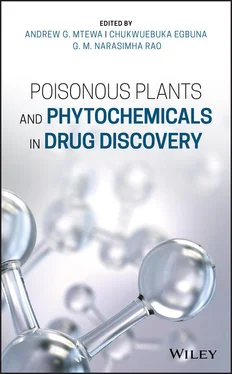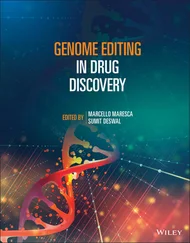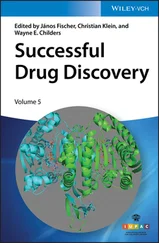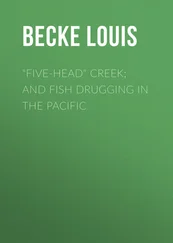Senyo BotchieNoguchi Memorial Institute for Medical Research, College of Health Sciences, University of Ghana, Legon, Ghana Division of Biological Chemistry and Drug Discovery Unit, WCAIR, School of Life Sciences, University of Dundee, Dundee, UK
Ibrahim ChikoweDepartment of Pharmacy, College of Medicine, University of Malawi, Blantyre, Malawi
Michael K. DanquahChemical Engineering Department, University of Tennessee, Chattanooga, TN, USA
Chukwuebuka EgbunaDepartment of Biochemistry, Faculty of Natural Sciences, Chukwuemeka Odumegwu Ojukwu University, Uli, Anambra State, Nigeria Nutritional Biochemistry and Toxicology Unit, World Bank Africa Centre of Excellence, Centre for Public Health and Toxicological Research (ACE‐PUTOR), University of Port Harcourt, Port Harcourt, Rivers State, Nigeria
Shahira M. EzzatDepartment of Pharmacognosy, Faculty of Pharmacy, Cairo University, Cairo, Egypt Department of Pharmacognosy, Faculty of Pharmacy, October University for Modern Sciences and Arts (MSA), 6th October, Egypt
Farhat JabeenDepartment of Zoology, Government College University Faisalabad, Faisalabad, Pakistan
Jaison JeevanandamDepartment of Chemical Engineering, Faculty of Engineering and Science, Curtin University, Miri, Sarawak, Malaysia
Félicien Mushagalusa KasaliDepartment of Pharmacy, Faculty of Medicine and Pharmacy, Official University of Bukavu, Bukavu, Democratic Republic of the Congo Pharmbiotechnology and Traditional Medicine Center (PHARMBIOTRAC), School of Medicine, Mbarara University of Science and Technology, Mbarara, Uganda
Prabir Kumar KulabhusanDepartment of Chemistry and Biomolecular Science, University of Ottawa, Ottawa, Ontario, Canada
Fanuel LampiaoAfrica Centre of Excellency in Public Health and Herbal Medicine, College of Medicine, University of Malawi, Blantyre, Malawi
Roman LysiukDepartment of Pharmacognosy and Botany, Danylo Halytsky Lviv National Medical University, Lviv, Ukraine
Reuben S. MaghembeDepartment of Molecular Biology and Biotechnology, University of Dar‐Es‐Salaam, Dar‐Es‐Salaam, Tanzania
William Peter MitemboBiomedical Sciences Department, College of Medicine, University of Malawi, Zomba, Malawi Water Quality Pollution Control Division, Ministry of Agriculture, Irrigation and Water Development, Lilongwe, Malawi
Andrew G. MtewaDivision of Biological Chemistry and Drug Discovery, WCAIR, School of Life Sciences, University of Dundee, Dundee, UK Chemistry Section, Malawi Institute of Technology, Malawi University of Science and Technology, Limbe, Malawi Pharmbiotechnology and Traditional Medicine Center (PHARMBIOTRAC), School of Medicine, Mbarara University of Science and Technology, Mbarara, Uganda
Thokozani Kachulu MtewaDepartment of Water Resources, Ndata School of Climate and Earth Sciences, Malawi University of Science and Technology, Limbe, Malawi
Naveed MunirDepartment of Biochemistry, Government College University Faisalabad, Faisalabad, Pakistan
Kennedy J. NgwiraInstitute of Molecular Science, School of Chemistry, University of Witwatersrand, Johannesburg, South Africa
Patrick Engeu OgwangDepartment of Pharmacy, Mbarara University of Science and Technology, Mbarara, Uganda Pharmbiotechnology and Traditional Medicine Center (PHARMBIOTRAC), School of Medicine, Mbarara University of Science and Technology, Mbarara, Uganda
Oluwaseyi OlaniyanNutritional and Toxicological Research Laboratory, Department of Biochemistry, Osun State University, Osogbo, Nigeria
Petro OliynykDepartment of Disaster Medicine and Military Medicine, Danylo Halytsky Lviv National Medical University, Lviv, Ukraine
G.M. Narasimha RaoDepartment of Botany, Andhra University, Visakhapatnam, Andhra Pradesh, India
Zarfishan RiazDepartment of Eastern Medicine, Government College University Faisalabad, Faisalabad, Pakistan
Itoan RoliDepartment of Anatomy, College of Basic Medical Science, Edo University Iyamho, Iyamho, Edo State, Nigeria
Mohamed A. SalemDepartment of Pharmacognosy, Faculty of Pharmacy, Menoufia University, Shibin Elkom, Egypt
Duncan C. SesaaziPharmbiotechnology and Traditional Medicine Center (PHARMBIOTRAC), School of Medicine, Mbarara University of Science and Technology, Mbarara, Uganda
Umang ShahDepartment of Pharmaceutical Chemistry, Ramanbhai Patel College of Pharmacy, Charotar University of Science and Technology, Changa, Gujarat, India
Gaétan TabakamDepartment of Chemistry and Natural Products, University of Dschang, Dschang, Cameroon
Casim Umba ToloPharmbiotechnology and Traditional Medicine Center (PHARMBIOTRAC), School of Medicine, Mbarara University of Science and Technology, Mbarara, Uganda Department of Biology, Mbarara University of Science and Technology, Mbarara, Uganda
Dmytro VoronenkoUkrainian Military Medical Academy, Kyiv, Ukraine
Tadele Mekuriya YadesaDepartment of Pharmacy, Mbarara University of Science and Technology, Mbarara, Uganda Pharmbiotechnology and Traditional Medicine Center (PHARMBIOTRAC), School of Medicine, Mbarara University of Science and Technology, Mbarara, Uganda
Sadia ZafarDepartment of Botany, Division of Science and Technology, University of Education, Lahore, Pakistan
Rabia ZahidDepartment of Eastern Medicine, Government College University Faisalabad, Faisalabad, Pakistan
Ahmed ZayedDepartment of Pharmacognosy, College of Pharmacy, Tanta University, Tanta, Egypt
Phytochemicals play a major role in the day‐to‐day management of diseases and health. There have been many reports of their effectiveness as community medicines and as alternatives to conventional drugs. However, there is one area that has been grossly underrepresented by researchers in phytochemistry. This is the area of poisonous plants and the role that phytochemicals play as toxins in society and how they could be harnessed for the betterment of mankind. There are many open‐source, non‐scholarly outlets and information that is not reviewed and that receives minimal scientific discussion.
Poisonous Plants and Phytochemicals in Drug Discovery seeks to address the roles that poisonous plants and phytotoxins play as friends and foes in society. It covers the mechanisms, benefits, risks, and management protocols of phytotoxins in scientific laboratories and their usefulness in drug discovery. This book contains insights that can help in the development of antidotes against some phytochemicals and other synthetic toxic chemical agents and raises awareness of which plants need to be categorized for protection and controls and those that can be helpful in assisting as emergency medicines. This book is carefully designed to show the contribution that phytochemicals play in safety and health management and how they could inform policies at national and international levels. Various industrial communities, researchers, and scholarly drug developers will be well guided on how best to create relevant measures to counter and/or manage toxins using phytochemicals or other means. The chapters in this book are presented in a clear and consistent manner to aid flow and continuity.
Andrew G. MtewaAndrew is a member of the American Chemical Society, the Phytochemical Society of Europe and the National Organization for the Professional Advancement of Black Chemists and Chemical Engineers and an associate member of the Royal Society of Chemistry. He studied Education (Chemistry) for a Bachelor’s degree and Applied Chemistry (Natural Product Chemistry) for his MSc at Chancellor College, University of Malawi. For his PhD, he trained in Medicinal Chemistry, focusing on drug design, synthesis, and development at the University of Dundee, UK, under the Wellcome Centre for Anti‐Infectives Research training program, and in Pharmbiotechnology (Medicinal Chemistry) at Mbarara University of Science and Technology in Uganda. His current interest and the focus of his research group is in the designing, synthesis, and hit expansion of potential drugs against diseases that cause a heavy burden on developing countries. He is also interested in encouraging developing countries to be much more involved in medicinal chemistry and all preclinical aspects of the drug development pipeline beyond just extracts. He is a lead editor of another book on phytochemistry with Elsevier and carries out reviews for some journals, including BMC’s Systematic Reviews and Elsevier’s Tuberculosis . Andrew teaches Chemistry at the Malawi University of Science and Technology.
Читать дальше












